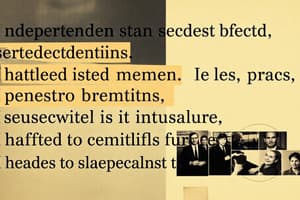Podcast
Questions and Answers
Which of the following statements is an independent clause?
Which of the following statements is an independent clause?
- When I finish my homework.
- I baked her a cake. (correct)
- Since it was my mother's birthday, I baked her a cake.
- If you have worked with the soil, you are familiar with humus.
An independent clause cannot stand alone as a complete sentence.
An independent clause cannot stand alone as a complete sentence.
False (B)
Provide an example of a sentence with more than one independent clause.
Provide an example of a sentence with more than one independent clause.
I baked her a cake, and she loved it.
An independent clause expresses a complete _____ and can stand by itself.
An independent clause expresses a complete _____ and can stand by itself.
Match the following sentences with whether they are independent clauses or not:
Match the following sentences with whether they are independent clauses or not:
What is a defining characteristic of independent clauses?
What is a defining characteristic of independent clauses?
Every clause expresses a complete thought.
Every clause expresses a complete thought.
What are clauses that do not express a complete thought called?
What are clauses that do not express a complete thought called?
A clause is a group of words that contains a verb and its _______.
A clause is a group of words that contains a verb and its _______.
Match the following types of clauses with their descriptions:
Match the following types of clauses with their descriptions:
Which of the following sentences contains a dependent clause?
Which of the following sentences contains a dependent clause?
A dependent clause can stand alone as a complete sentence.
A dependent clause can stand alone as a complete sentence.
Name a word that often introduces a dependent clause.
Name a word that often introduces a dependent clause.
The animals ______ I saw in the game preserve were from hunters.
The animals ______ I saw in the game preserve were from hunters.
Match the following dependent clause starters to their type:
Match the following dependent clause starters to their type:
Which of the following is an example of a coordinating conjunction?
Which of the following is an example of a coordinating conjunction?
Subordinating conjunctions can introduce adverb clauses.
Subordinating conjunctions can introduce adverb clauses.
Name one subordinating conjunction.
Name one subordinating conjunction.
Which sentence correctly uses a noun clause as a direct object?
Which sentence correctly uses a noun clause as a direct object?
A correlative conjunction can be seen in the phrase '______...or'.
A correlative conjunction can be seen in the phrase '______...or'.
Match the conjunction to its type:
Match the conjunction to its type:
A noun clause can only function as a subject in a sentence.
A noun clause can only function as a subject in a sentence.
Provide an example of a noun clause functioning as an object of a preposition.
Provide an example of a noun clause functioning as an object of a preposition.
___ Ann was angry was obvious.
___ Ann was angry was obvious.
Match the following nouns with their corresponding noun clause usage:
Match the following nouns with their corresponding noun clause usage:
What is the purpose of an adjective clause?
What is the purpose of an adjective clause?
An adjective clause can stand alone as a complete sentence.
An adjective clause can stand alone as a complete sentence.
Provide an example of an adjective clause.
Provide an example of an adjective clause.
An adjective clause usually follows immediately after the __________ it modifies.
An adjective clause usually follows immediately after the __________ it modifies.
Match the following examples with their corresponding types:
Match the following examples with their corresponding types:
What is the primary function of an adverb clause?
What is the primary function of an adverb clause?
An adverb clause can stand alone as a complete sentence.
An adverb clause can stand alone as a complete sentence.
Provide an example of an adverb clause.
Provide an example of an adverb clause.
An adverb clause modifies a verb, adjective, or adverb by describing how, when, where, ______, or to what extent.
An adverb clause modifies a verb, adjective, or adverb by describing how, when, where, ______, or to what extent.
Match the following sentences with the type of information their adverb clauses provide:
Match the following sentences with the type of information their adverb clauses provide:
What function does the introductory word 'whoever' serve in the clause 'whoever asks for one'?
What function does the introductory word 'whoever' serve in the clause 'whoever asks for one'?
The introductory word 'that' in the sentence 'Their complaint was that the milk smelled sour' serves a dual function.
The introductory word 'that' in the sentence 'Their complaint was that the milk smelled sour' serves a dual function.
Provide a noun clause that can act as the direct object in a sentence.
Provide a noun clause that can act as the direct object in a sentence.
The direct object of the verb in the sentence 'They told him _____' is a noun clause.
The direct object of the verb in the sentence 'They told him _____' is a noun clause.
Match the introductory words with their functions in the provided sentences:
Match the introductory words with their functions in the provided sentences:
What is the main characteristic of a prepositional phrase?
What is the main characteristic of a prepositional phrase?
An appositive can be a single noun or pronoun.
An appositive can be a single noun or pronoun.
Define a verbal.
Define a verbal.
A ______ phrase contains a verbal and its related words.
A ______ phrase contains a verbal and its related words.
Match the type of phrase with its correct description:
Match the type of phrase with its correct description:
Which of the following questions helps to identify a dependent clause?
Which of the following questions helps to identify a dependent clause?
A noun clause can function as an adverb in a sentence.
A noun clause can function as an adverb in a sentence.
List two subordinating conjunctions.
List two subordinating conjunctions.
The clause begins with a __________ pronoun if it is dependent.
The clause begins with a __________ pronoun if it is dependent.
Match each clause function with its description:
Match each clause function with its description:
What type of questions are used to determine the function of an adverb clause?
What type of questions are used to determine the function of an adverb clause?
A clause that starts with a subordinating conjunction cannot be an independent clause.
A clause that starts with a subordinating conjunction cannot be an independent clause.
What is the primary role of a dependent clause in a sentence?
What is the primary role of a dependent clause in a sentence?
Flashcards
Independent Clause
Independent Clause
A clause that expresses a complete thought and can stand alone as a sentence.
Complete Thought
Complete Thought
An idea or concept that can convey a full meaning on its own.
Sentence
Sentence
A group of words that expresses a complete thought.
Multiple Independent Clauses
Multiple Independent Clauses
Signup and view all the flashcards
Example of Independent Clause
Example of Independent Clause
Signup and view all the flashcards
Clause Definition
Clause Definition
Signup and view all the flashcards
Clause roles
Clause roles
Signup and view all the flashcards
Subject-Verb
Subject-Verb
Signup and view all the flashcards
Dependent Clause Starter Words
Dependent Clause Starter Words
Signup and view all the flashcards
Dependent Clause Example
Dependent Clause Example
Signup and view all the flashcards
Main Clause
Main Clause
Signup and view all the flashcards
Complete Sentence
Complete Sentence
Signup and view all the flashcards
Subject Noun Clause
Subject Noun Clause
Signup and view all the flashcards
Predicate Nominative Noun Clause
Predicate Nominative Noun Clause
Signup and view all the flashcards
Direct Object Noun Clause
Direct Object Noun Clause
Signup and view all the flashcards
Indirect Object Noun Clause
Indirect Object Noun Clause
Signup and view all the flashcards
Subordinating Conjunction
Subordinating Conjunction
Signup and view all the flashcards
Adverb Clause
Adverb Clause
Signup and view all the flashcards
Examples of Subordinating Conjunctions
Examples of Subordinating Conjunctions
Signup and view all the flashcards
How Subordinating Conjunctions Work
How Subordinating Conjunctions Work
Signup and view all the flashcards
What is a Subordinate Clause?
What is a Subordinate Clause?
Signup and view all the flashcards
Adjective Clause
Adjective Clause
Signup and view all the flashcards
What does an adjective clause do?
What does an adjective clause do?
Signup and view all the flashcards
Where does it usually appear?
Where does it usually appear?
Signup and view all the flashcards
Example of an Adjective Clause
Example of an Adjective Clause
Signup and view all the flashcards
How is it like an adjective?
How is it like an adjective?
Signup and view all the flashcards
Adverb Clause Function
Adverb Clause Function
Signup and view all the flashcards
Adverb Clause Example
Adverb Clause Example
Signup and view all the flashcards
Commas with Adverb Clauses
Commas with Adverb Clauses
Signup and view all the flashcards
What does an adverb clause modify?
What does an adverb clause modify?
Signup and view all the flashcards
Introductory Word
Introductory Word
Signup and view all the flashcards
Function within the Clause
Function within the Clause
Signup and view all the flashcards
Function of the Entire Clause
Function of the Entire Clause
Signup and view all the flashcards
Predicate Nominative
Predicate Nominative
Signup and view all the flashcards
7 Noun Words
7 Noun Words
Signup and view all the flashcards
Relative Pronoun
Relative Pronoun
Signup and view all the flashcards
Predicate Nominative Clause
Predicate Nominative Clause
Signup and view all the flashcards
Object of the Preposition Clause
Object of the Preposition Clause
Signup and view all the flashcards
What is a phrase?
What is a phrase?
Signup and view all the flashcards
Prepositional Phrase
Prepositional Phrase
Signup and view all the flashcards
Appositive
Appositive
Signup and view all the flashcards
Verbal
Verbal
Signup and view all the flashcards
Verbal Phrase
Verbal Phrase
Signup and view all the flashcards
Study Notes
Independent Clause
- An independent clause expresses a complete thought and can stand by itself as a sentence.
- Examples:
- I baked her a cake.
- Since it was my mother's birthday, I baked her a cake.
- If you have worked with the soil, you are familiar with hummus.
- Humilis means "on the ground," and from this Latin word we derive the word "humility."
Studying That Suits You
Use AI to generate personalized quizzes and flashcards to suit your learning preferences.




